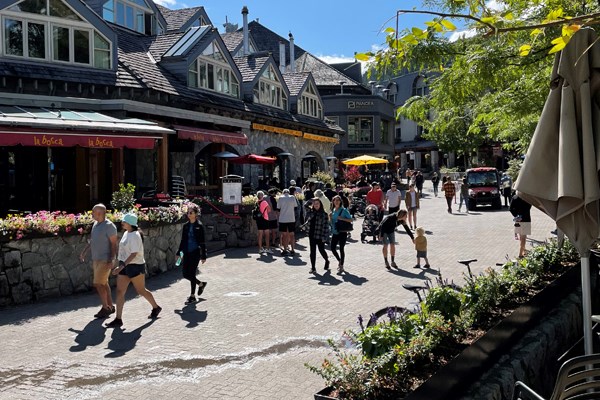Checking in over the weekend with a friend who manages some restaurants in town, I was disheartened (though not overly surprised) by her response.
“I greeted the last table of the night with ‘are you going to yell at me?!’” she said, in trying to give me a sense of how her Friday-night shift went. To hear it from her, Saturday was even worse.
Apparently, having to endure a bit of a wait for a table or a drink turns some of us into quivering masses of entitled rage, unable to control our emotional outbursts or act like rational adults.
Ask any frontline worker in Whistler lately, and you’re likely to hear similar stories of embarrassing, unwarranted abuse from visitors.
Not every guest acts this way, of course (and a massive, heartfelt thank-you to those of you who understand what we’re dealing with these days)—but even one such instance is too many.
After 17 months of COVID-19, Whistler and its workforce—like much of the rest of society—is reaching a breaking point.
Visitors have returned en masse, and you’d be hard-pressed to find a business in town that isn’t struggling to keep up with the demand.
People are working extra shifts and extended hours to try to fill in the gaps, in some cases doing jobs normally covered by three or even four people.
Restaurants are shortening hours and menus; coffee shops are closing early; hotels are keeping rooms blocked off.
As a town that prides itself on providing an exceptional guest experience, this is all quite hard to swallow.
Whenever Pique publishes an article about staffing shortages, Facebook commenters wax eloquently about how businesses should simply pay more if they want to attract workers.
And yes, offering better wages and addressing the high cost of resort living are absolutely part of the solution.
But it’s not that simple. Several businesses in Whistler and elsewhere have gone above and beyond to attract staff with competitive wages, affordable housing and other perks. Other small business owners simply can’t afford to pay higher wages, and especially not after 17 months of near-bottomed-out tourism revenues while staring down mountains of COVID-19-related debt.
According to Walt Judas, president and CEO of the Tourism Industry Association of BC, some hotel operators in the province are paying housekeepers upwards of $30 an hour, and are still unable to find people to fill the jobs. Because the people simply aren’t there.
It’s not really a new problem, just a deeply exacerbated one. Labour shortages have been a thorn in the B.C. tourism industry’s side since I arrived in Whistler seven years ago, and likely long before that. Prior to the pandemic, the industry estimated it would need to fill 100,000 jobs over the next 10 years to adequately serve visitors to the province.
COVID has likely cast all previous tourism growth projections by the wayside, at least for the near term. With a fourth wave of infections bearing down on us, uncertainty is still the name of the game.
But if anything is certain right now it’s that Whistler, its workers and its establishments are going to have to continue to suffer through the late pandemic summer and what is sure to be another busy winter.
Because while local business leaders are advocating for easier access to working holiday visa holders and other temporary foreign workers, there are no quick or easy answers to soothe the pain.
What does this all mean for Whistler’s long-term outlook? What happens to the guest experience when we can’t properly staff our businesses? Looking further out, what does that do to our reputation as a desirable place to visit?
These are big questions beyond my paygrade, but you can bet it’s a discussion taking place at Tourism Whistler (TW).
“I think from our perspective, what we’re really asking of our visitors is to please have patience,” TW’s president and CEO Barrett Fisher told Pique earlier this month.
“Whistler typically would enjoy a much larger international labour pool that is not here today, and so we are really doing the best we can with the limited resources that we have.”
Diana Chan, owner of Zog’s and Moguls and chair of the Whistler Chamber of Commerce board, had a similar plea.
“The mental health of our workforce is top of mind for me,” she said. “People are working hard. They’re good people, and we’re all just doing our best with what we’ve got.”
So please, enjoy your visit to Whistler. But while you’re here, try to be patient. Try to be kind. Don’t yell at your server because you had to wait to be seated.
I promise you that isn’t going to make the beer colder, or the service any more efficient. If anything, it’s only going to force more workers to give up the ghost entirely.
After 17 months of a global pandemic, we’re all over it. But we’re doing our best.




